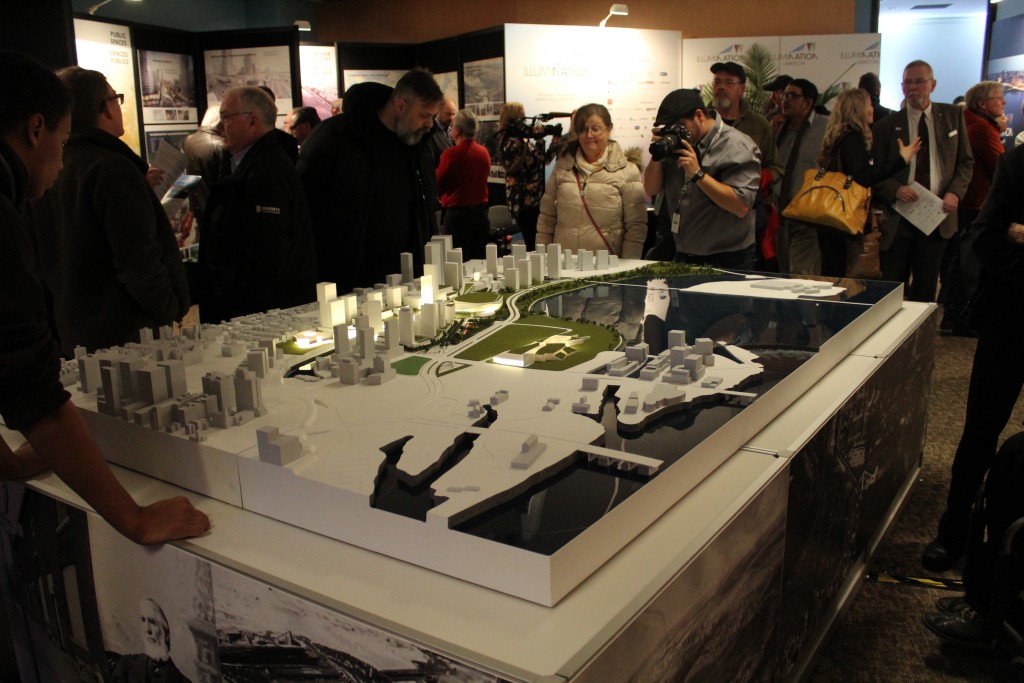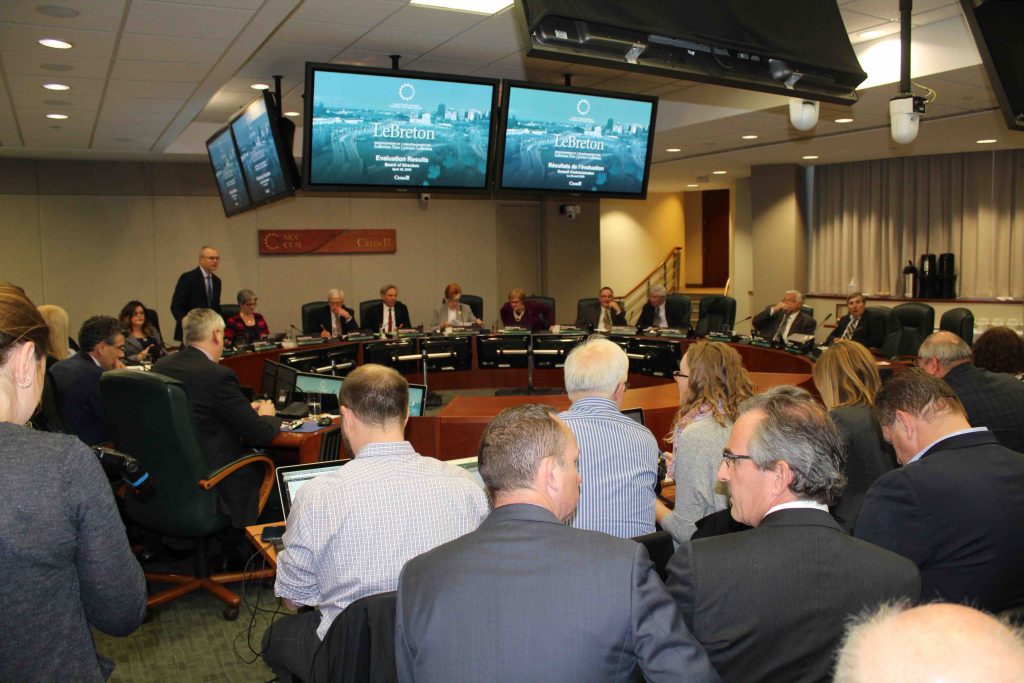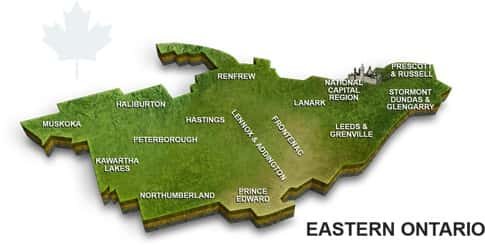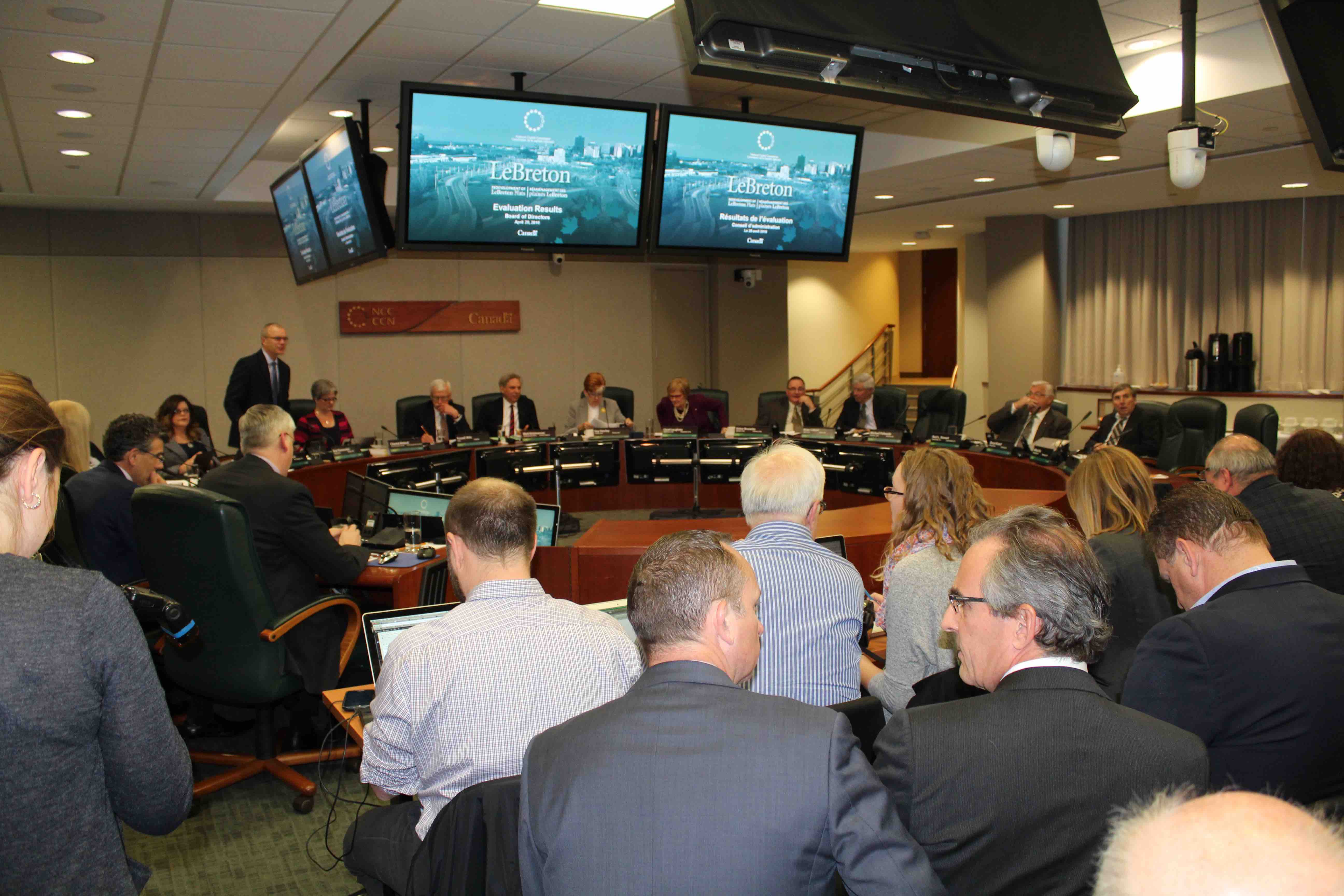Ottawa Senators’ owner Eugene Melnyk expressed relief and satisfaction minutes after he learned on April 28 that the National Capital Commission (NCC) had ranked the RendezVous Lebreton group highest in its Lebreton Flats redevelopment competition, and would become the preferred team to complete the multi-billion dollar project to reshape Ottawa’s central area.
In a media scrum at the NCC headquarters after commissioners unanimously selected the proposal that, if negotiated successfully, will see the Senators move to a downtown arena near the new Light Rail Transit (LRT) line, Melnyk said he was “surprised” by the decision, which ranked the proposal above a competing initiative from Devcore Candarel DLS Group (DCDLS), which had proposed an impressive array of public attractions, but which NCC evaluators considered to be risky of not being viable.

The news, of course, also created excitement and a sense of optimism among the other RendezVous partners. The main RLG partner, Trinity Development Group, will oversee much of the commercial and mixed use development, with other players including Windmill Developments, Brigil, and Mattamy Homes. Other participants include Morley Hoppner, Tomlinson, PCL and GBA (Graham Bird Associates).
Architect Barry Hobin led the RLG presentation when the NCC invited the two proponents to demonstrate their plans on Jan. 26. RLG has other significant architectural supporters including Rossetti, KPMB Architects, Perkins + Will, and Schmidt/Hammer/Lassen Architects.

Melnyk would like to see the project to move more quickly than the time the NCC believes will be needed to put shovels in the ground. NCC chief planner Stephen Wills believes it could take at least five years before construction begins on the site, which has been vacant for more than a half century.
(Exact financial details about the scale and scope of the project remain confidential and subject to negotiation, but Melnyk let out in an earlier interview that remediation costs of the site could reach $170 million. There is a primary 9.3-hectare parcel of land across from the war museum and, if required, an optional 12.3-hectare parcel to the west.)
First, of course, RLG has to negotiate the actual agreement with the NCC, which has made it clear that the DCDLS bid remains in contention as a backup if negotiations with RLG fail. There are environmental, aboriginal, and municipal approvals that also need to be co-ordinated. There needs to be official plan and zoning amendments and other agreements.
Melnyk said the Senators have largely completed plans for what to do with the existing Canadian Tire Centre in Kanata once the team moves to Lebreton Flats, and will release their vision once they’ve clarified some details.
NCC evaluators said they were impressed with both of the Lebreton Flat proposals, winnowed down from an initial five applicants and a short list of four organizations who were invited to submit detailed proposals by last December. In the end, only DCDLS and RLG introduced comprehensive plans, which were presented at a public disclosure at the Canadian War Museum in late January.
The NCC says 7,939 people completed surveys during the public consultation period between January 26 and Feb. 8. Consultants used data analysis to look at the major points and concerns, and these observations were provided to the evaluation committee composed of three NCC staffers plus architect Jack Diamond (Diamond Schmitt Architects) and professional planner and land economist Mark Conway (N. Barry Lyon Consultants).
The evaluators, taking into account the public responses, provided significant weight to the RLG plans to cover the LRT

tracks and create a street/public area above them, avoiding a site bi-sectioning, with rumbling trains, fences and barriers. The proposal also takes advantage of the area’s historical canals to create a vibrant community and commercial environment, the evaluators reviewed.
NCC planner Willis said the evaluation committee thought the decision to cover the LRT was “bold” and vital to the redevelopment strategy. NCC chief executive officer Mark Kristmanson said after the meeting that the LRT provided the greatest site challenge. “In the end, the RendezVous Lebreton group handled that challenge very well.”
Both proposals suggested that the new Ottawa Public Library (possibly combined with the National Archives/Library) would be a worthy part of the development, but the NCC evaluators ignored the RLG proposal in part because the team proposed the library to be built on land outside of the designated development area.
The evaluators liked the many public use initiatives in the DCDLS proposal, including a proposal for residential neighbourhood with an elementary school, supermarket, and YM-YWCA. However, a proposed automobile museum seemed inconsistent with the DCDLS’s environmentally friendly approach, and the evaluators said the design of a major parking underground area with a single entrance might result in serious congestion if built as proposed.
On the RLG side, the evaluators liked the central location and design for the sports and entertainment centre, and also thought the Abilities Centre, a proposed resource for disabled athletes, combined with a new SensPlex, would serve the community well. They expressed some concern about the market’s ability to absorb the volume of residential development proposed, and believed that its retail component is too large.
NCC chair Russel Mills said board members came to Ottawa a day early for a technical briefing from the Lebreton Flats evaluation committee, and took a tour of the site.
He said evaluation committee members Diamond and Conway said “this was to be the best selection process they had ever been through in their careers.”








